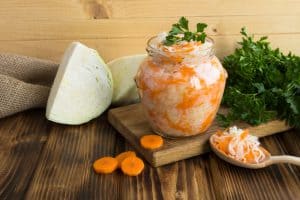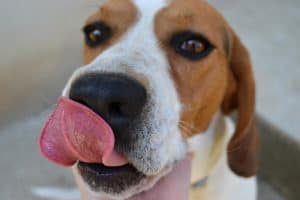Diet for dogs with cancer – Every bite counts
A proper diet for dogs with cancer is not just a complementary part of treatment – in many cases, it can determine the outcome. The right nutrition supports the immune system, reduces side effects, helps regeneration, and improves overall quality of life. Feeding your dog well is one of the most powerful things you can do for them – every single day, with every single bite.
When a dog is diagnosed with cancer, a part of the owner’s world collapses. The questions arise immediately: What can I do for them? What treatments exist? And what can I feed to help their recovery? The most important principle in feeding dogs with cancer is to provide an eating plan that supports the body’s defenses – not the tumor cells.
Why nutrition matters so much in canine cancer
Cancer cells demand a large amount of energy and tend to “steal” nutrients from healthy cells. This is why dogs with cancer often suffer from weight loss, muscle wasting, digestive problems, or chronic inflammation.
The goal of a proper canine cancer diet is not just to maintain body weight, but to deliver nutrients that enhance the dog’s natural immune defenses, support cell renewal, and reduce inflammation.
Many people don’t realize that dogs rarely die directly from cancer itself. In most cases, it’s because secondary organ failure – such as problems with the liver, kidneys, or spleen – eventually becomes fatal. However, with proper nutrition and consistent care, this process can often be delayed or even prevented through the right diet.
The grain question – what not to feed
Ask yourself: have you ever seen a dog grazing in a rice field or chewing on a wheat stalk? Probably not. And that’s not by accident.
For over 10 million years, dogs have been primarily meat-eaters. They are carnivores – not herbivores. In nature, dogs hunt prey animals and eat them whole, including organs, fat, bones, and some stomach content (partly plant-based). Yet, most commercial dog foods are based on rice, corn, or wheat.
So, what’s the problem?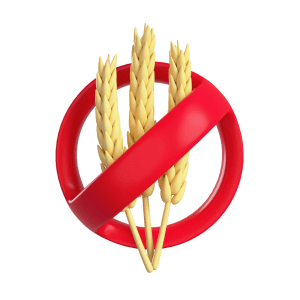
- Dogs do not produce enough enzymes to properly digest grains.
- Excessive carbohydrate intake can fuel the growth of cancer cells, since their main energy source is glucose.
- Grains can trigger inflammation, especially in dogs prone to allergies.
For this reason, a grain-free, high-protein, and low-carbohydrate diet for dogs with cancer is what most veterinarians and nutrition experts recommend.
Protein, fat and energy – what the cells really need
The body of a dog with cancer has one major task: to resist, repair, and rebuild. To achieve this, it needs plenty of high-quality protein and healthy fat – rather than grains. In fact, a balanced dog cancer diet provides everything the body requires to recover. While proteins help rebuild and maintain healthy cells, fats supply the essential energy, and by reducing carbohydrates, you can help slow down tumor growth and support long-term recovery.
A high-protein diet helps:
- maintain muscle mass,
- support tissue repair,
- ensure proper enzyme and hormone production.
Essential fatty acids – especially omega-3 (EPA, DHA) – help reduce inflammation, stabilize cell membranes, and may inhibit tumor growth2.
Important: always consult your veterinarian if your dog has liver, kidney, pancreas, or spleen issues, as these conditions can influence dietary recommendations.
Cooked or raw? The best option is a gradual transition
The natural raw feeding approach (BARF – Biologically Appropriate Raw Food) has become increasingly popular in recent years, as more owners are looking for natural ways to support recovery. This is because it often shows excellent results for dogs with cancer. In practice, the BARF method combines raw meat, organs, bones, and pureed vegetables and fruits in carefully balanced proportions to ensure optimal nutrition.
If your dog has been eating cooked food until now, don’t worry – there’s no need to switch overnight. The best approach is to introduce raw elements gradually, meal by meal. Dogs have stronger stomach acid than humans, so they can safely digest raw meat, organs, and even bones (only raw bones!).
BARF recipe for dogs with cancer
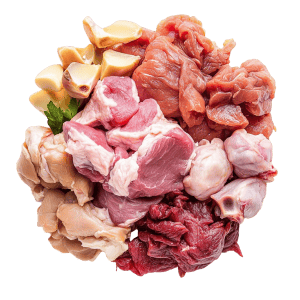
Weekly portion for a 23 kg active dog:
- 2 kg mixed raw minced meat (e.g. chicken, turkey, beef)
- 300 g minced meaty bones (e.g. chicken necks)
- 3 eggs
- 1 cup plain yogurt or cottage cheese
- 1 apple
- 2 carrots
- 800 g mixed vegetables (broccoli, kale, zucchini, spinach)
- 1 teaspoon flaxseed or salmon oil
Mix all ingredients, then form small patties, freeze them, and portion for daily meals. Typically, dogs consume 2–4% of their body weight per day. Because variety is essential, try to rotate different meat types and also vegetable-fruit combinations regularly so that you can provide a complete and balanced nutrient profile.
Always use high-quality meat from trusted sources and handle it hygienically to minimize bacterial risk and preserve nutritional value.
Natural supplements – what to consider
Natural supplements for dogs with cancer play a dual role: they can strengthen the immune system and help reduce side effects of conventional treatments.
-
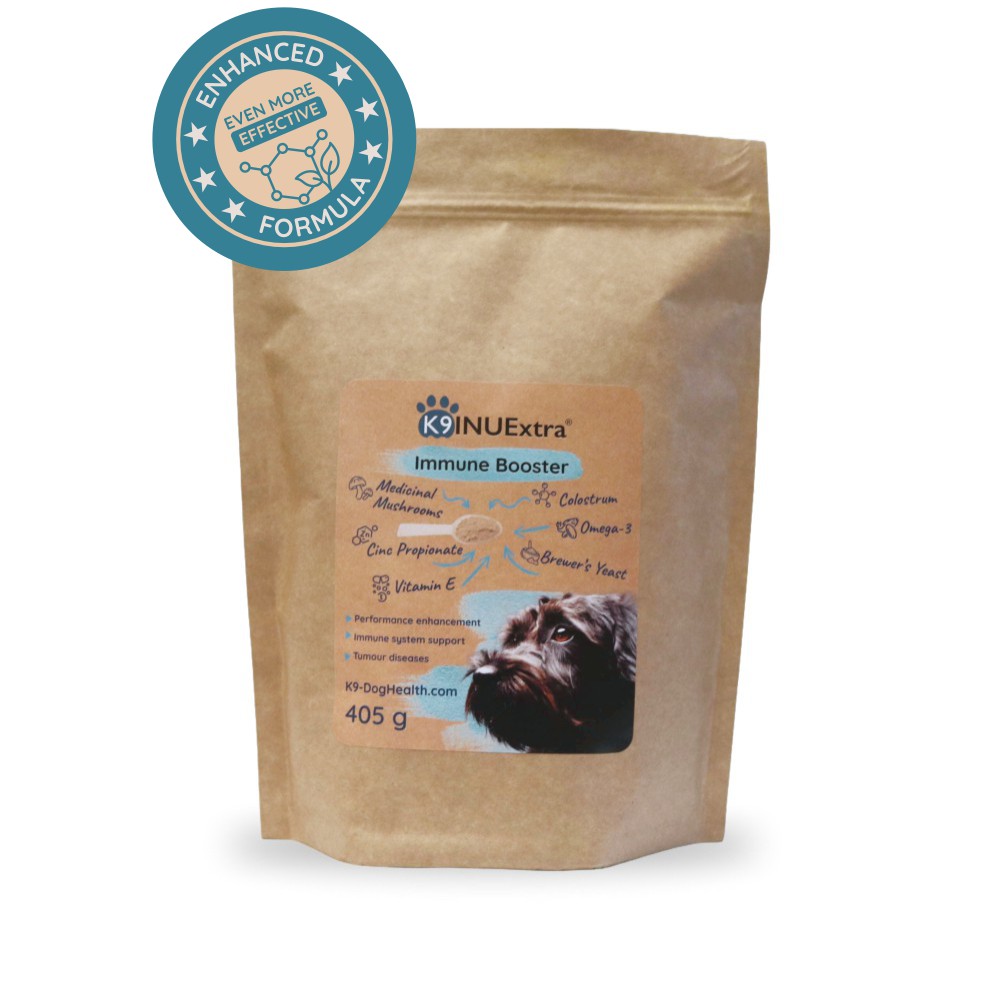

K9 INUExtra®
- Premium immune support with medicinal mushrooms and colostrum
- Anti-inflammatory support with curcumin, omega-3 and BioPerine
- Stronger gut flora and improved digestion with brewer’s yeast and targeted prebiotics
- Antioxidant cellular protection with vitamin E, zinc and natural active compounds
€61,89
The most commonly recommended natural supplements for dogs with cancer include:
- Medicinal mushrooms (Reishi, Turkey tail, Shiitake, Maitake, Cordyceps) – immun-modulating, cell-protective, and anti-tumor effects proven by several studies.
- Vitamin E (400 IU/day) – a powerful antioxidant that protects cells from oxidative stress and supports recovery.
- Selenium (100 µg/day) – boosts immune response and enhances cellular defense mechanisms.
- Green tea extract (decaffeinated, 50–100 mg/day) – rich in polyphenols that may slow tumor cell division4.
- Grape seed extract and quercetin – potent antioxidant flavonoids supporting overall cellular health.
- Omega-3 EPA/DHA + GLA – strong anti-inflammatory and cell-protective action that supports recovery and reduces inflammation.
Note: During chemotherapy or radiation therapy, not all antioxidants are recommended. Some veterinarians advise stopping antioxidant use for three days before and one week after treatment, as these may reduce the effectiveness of certain cancer drugs.
Summary – diet for dogs with cancer can be life-saving
Feeding your dog is not just routine – it’s a decision. A decision about what you give them when they need you the most. The right food for dogs with cancer is a powerful tool: it can reduce inflammation, strengthen the immune system, and support recovery.
There is no perfect diet – but there is always a better one. Every day is a new opportunity to bring your dog closer to healing – with one nutritious bite, one carefully chosen ingredient, one act of care.
Want to know how to make your own probiotic for your dog? Or would you like to learn more about the different types of dog cancer, electrochemotherapy, or the role of colostrum in supporting the immune system? If so, explore our articles, because you’ll find all the information and answers you need.
Frequently asked questions about the diet for dogs with cancer
❓ What can a dog with cancer eat?
A canine cancer diet should be high in protein, low in carbohydrates, and completely grain-free. Meat, organs, eggs, fish, vegetables, and healthy fats (like salmon oil) are the best options.
❓ Why is nutrition so important for dogs with cancer?
Cancer cells feed on glucose, so excessive carbohydrates can accelerate their growth. A well-designed diet supports the immune system, reduces inflammation, and promotes regeneration.
❓ Can I feed raw meat to a dog with cancer?
Yes, but it must be introduced gradually. The BARF method (raw feeding) gives dogs natural access to proteins, fats, and enzymes that strengthen immunity. Always maintain hygiene and consult your vet.
❓ What supplements help dogs with cancer?
Common natural supplements include medicinal mushrooms (Reishi, Shiitake, Maitake, Cordyceps), vitamin E, selenium, omega-3 fatty acids, and green tea extract. These support cellular protection and immune function.
❓ How much protein does a dog with cancer need?
It depends on weight and activity, but typically 40–50% of the daily intake should come from high-quality animal protein sources such as chicken, turkey, beef, fish, or eggs.
❓ What foods should be avoided?
Avoid grains, sugar, corn, soy, and any food with artificial additives. These can promote inflammation and burden the digestive system.
❓ Are probiotics beneficial for dogs with cancer?
Yes, probiotics help maintain gut balance, improve digestion, and strengthen the immune system – all vital for dogs with cancer.
❓ When should I consult a professional about my dog’s diet?
Always consult a veterinarian or canine nutrition expert if your dog has cancer. They can tailor the diet and supplements to your dog’s treatment plan and organ health.
Important:
This article about the diet for dogs with cancer is for informational purposes only and does not replace professional veterinary examination or treatment. Always consult your veterinarian for proper diagnosis and therapy.
References:
- Seyfried, T. N., & Shelton, L. M. (2010). Cancer as a metabolic disease. Nutrition & Metabolism, 7(7).
- Calder, P. C. (2015). Marine omega-3 fatty acids and inflammatory processes: Effects, mechanisms and clinical relevance. Biochimica et Biophysica Acta (BBA) – Molecular and Cell Biology of Lipids, 1851(4), 469–484.
- Vetvicka, V., & Vetvickova, J. (2014). Immune-enhancing effects of Maitake and Shiitake extracts. Journal of Medicinal Food, 17(5), 532–538.
- Yang, C. S., et al. (2009). Cancer prevention by tea: molecular mechanisms and human relevance. Nature Reviews Cancer, 9(6), 429–439.
